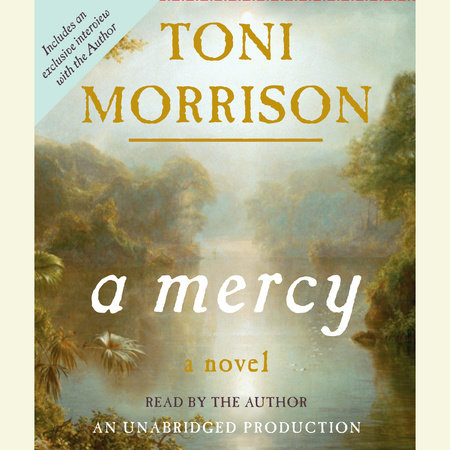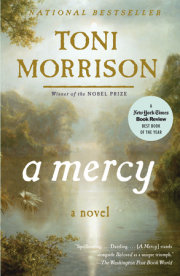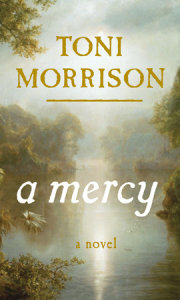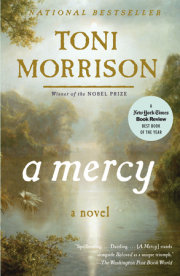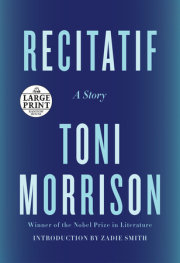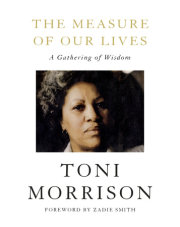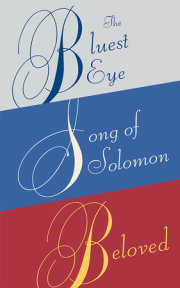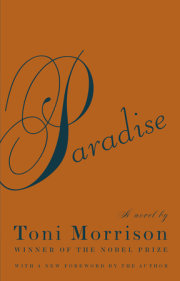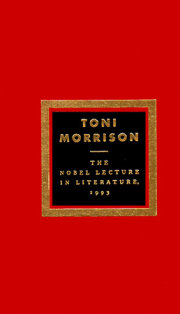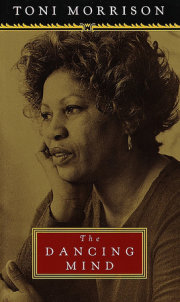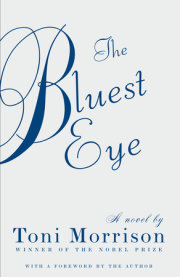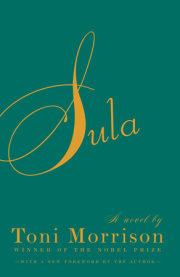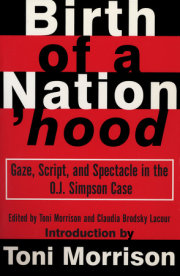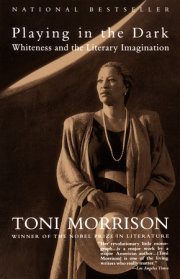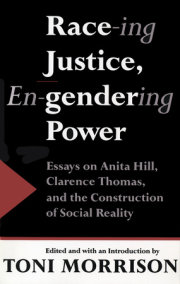“A horrifying act stood at the center of Toni Morrison’s 1987 masterwork, Beloved: a runaway slave, caught in her effort to escape, cuts the throat of her baby daughter with a handsaw, determined to spare the girl the fate she herself has suffered as a slave. A similarly indelible act stands at the center of Ms. Morrison’s remarkable new novella, A Mercy, a small, plangent gem of a story that is, at once, a kind of prelude to Beloved and a variation on that earlier book’s exploration of the personal costs of slavery–a system that moves men and women and children around ‘like checkers’ and casts a looming shadow over both parental and romantic love.
Set some 200 years before Beloved, A Mercy conjures up the beautiful, untamed, lawless world that was America in the 17th century with the same sort of lyrical, verdant prose that distinguished that earlier novel. . . . Ms. Morrison has rediscovered an urgent, poetic voice that enables her to move back and forth with immediacy and ease between the worlds of history and myth, between ordinary daily life and the realm of fable. . . . A heartbreaking account of lost innocence and fractured dreams, [that] also stands, with Beloved, as one of Ms. Morrison’s most haunting works yet.”
–Michiko Kakutani, The New York Times
“Spellbinding . . . Dazzling . . . [A Mercy] stands alongside Beloved as a unique triumph in Morrison’s body of work. The lush poetry and amorphous structure of [the novel] reflect the story’s distant setting in the mist of America’s creation, when independence and the three-fifths compromise of the Constitution were still a century away. . . . Morrison, who has written so powerfully of catastrophe, cruelty and horror, here adds to that song of tragedy equally thrilling chords of desire and wonder, which in their own way are no less tragic. Where Beloved ends with the cathartic exhaustion of an exorcism, A Mercy concludes with an ambiguous kind of prayer, redolent with possibility and yearning but inspired by despair. This rich little masterpiece is a welding of poetry and history and psychological acuity that you must not miss.”
–Ron Charles, The Washington Post Book World
“Luminous and complex . . . In Beloved, Morrison told the story of Sethe, a woman who murdered her own child rather than see her sold into slavery. Early on in A Mercy, we watch a mother do the opposite–she puts her daughter Florens up for sale . . . It’s a less bloody moment, but in its way it’s no less chilling. A Mercy is that daughter’s tale. . . . Morrison is mooting the perversely hopeful possibility that slavery could have existed without racism or at least without racism as we know it. She lavishes some of her best writing in years on [A Mercy’s] pre-Revolutionary world . . . A Mercy shows us America in the moment before race madness ruined it–it is a wounded land, but the wound has not yet turned septic. . . . In A Mercy, Morrison is urging her younger self, the tortured soul who fashioned the infernal vision that is Beloved, to look even further–beyond the veil of pain and anger, however righteous, to hope. There was a time before the present misery, Morrison seems to be telling herself. And therefore, maybe, there will be a time after it.”
–Lev Grossman, Time
“Magnificent . . . As with all Morrison’s finest work, A Mercy compellingly combines immediacy and obliquity. Its evocation of pioneer existence in America surrounds you with sensuous intensity. . . . An attack by a bear is described with thrilling power. . . . Idioms have potent directness, too. . . . Rich knowledgeability about 17th-century America is put to telling effect. Voices speak to you as if you were there. . . . The book keeps you vividly aware of the vital human individuality that racism’s crude categorizations are brutally trying to iron out. . . . A stark story of the evils of possessiveness and the perils of dispossession emerges slantwise. Hints, suspicions, secrets, ambivalences, scarcely acknowledged motives and barely noticeable nuances serve as signposts to enormities and desperations: around slavery’s large-scale uprootings, Morrison spotlights individual instances of loss (orphans and outcasts are, as often in her fiction, much in evidence; compensatory alliances they form are warmly portrayed). A Mercy is so enthralling that you’ll want to read it more than once. On each occasion, it further reveals itself as a masterpiece of rewarding complexity.”
–Peter Kemp, The Sunday Times (London)
“In [A Mercy,] a mother chooses to give her daughter to a stranger, the man who will ‘own’ her, in hopes that she’ll find a better life. It is this act from which the book derives its title, but it is, of course, an ambivalent gesture whose tragic resonance will be slowly unveiled. . . . Morrison here is seeking some deeper truth about what she once called ‘the presence of the unfree within the heart of the democratic experiment.’ Some regard this novel as a kind of prelude to Beloved, but the author has even more provocative ideas at play. . . . In writing about the horror of slavery, she finds a kind of ragged hope.”
–Renée Graham, Boston Sunday Globe
“[A Mercy] examines slavery through the prism of power, not race. Morrison achieves this by setting A Mercy in 1680s America, when slavery was a color-blind, equal-opportunity state of misery, not yet the rigid, peculiar institution it would become. . . . Morrison doesn’t write traditional novels so much as create a hypnotic state of poetic intoxication. You don’t read A Mercy, you fall into a miasma of language and symbolism. [It] offers an original vision of America in its primeval state, where freedom was a rare commodity.”
–Deirdre Donahue, USA Today
“[Toni Morrison] bound[s] into literature with her new book as if it were the first time, with the spry energy of a doe. A Mercy . . . is that beguiling and beautiful, that deftly condensed, that sinewy with imaginative sentences, lyric flight and abundant human sensitivity. . . . Finely hammered phrases repeatedly come off the anvil, forming a story as powerful as the many she has shaped before. Elements of this writer’s art from way back remain part of her achievement here. Like a mighty telescope perched on a contemporary plateau, Morrison draws in signals, moods, torments, exhilarations from African American life and history . . . Morrison mixes the verbal music of an era with idiosyncratic wisdom, delivered indirectly rather than ex cathedra, recalling omniscient Russian masters without imitating them. . . . Along the way come moments whose artistry freezes one’s page-turning. Morrison’s tactile reports rivet . . . What’s the opposite of ‘lazy’ in a fiction writer’s style and research? Industrious? Indefatigable? Morrison wears her knowledge lightly, yet every page exhibits her control of [the 17th century’s] objects and artifacts, its worries and dangers. She surrounds A Mercy’s more fanciful arabesques with a broad border of realism. . . . A book as masterfully wrought as A Mercy behooves its author to swagger. Go to it, Ms. Morrison.”
–Carlin Romano, The Philadelphia Inquirer
“A grand tragedy writ in miniature . . . Women, men, Africans, Native Americans, whites, masters, slaves–all are cast into the hard world that is the New World in Toni Morrison’s lustrous new novel. In the same way, the Nobel Prize winner casts us into her hypnotic, many-voiced narrative set in the 17th century in a nation yet unformed. . . . We’re beguiled from the opening sentence: ‘Don’t be afraid.’ The speaker is Florens, black, barely out of childhood, a slave but literate, whose eager-to-please ways and lyrical language endear her to us and to the Virginia household of Jacob Vaark. . . . The subject of [A Mercy] is slavery, and [Morrison] brings to it, along with some of her most haunting language, elements of history and mythos. . . . A Mercy is kindled by characters who are complex and vulnerable, full of what she describes in Beloved as ‘awful human power.’ . . . This novel’s release coincides with the presidential election of Barack Obama, a shining moment in our country’s history of which Morrison’s characters can barely dream.”
–Ellen Kanner, The Miami Herald
“Themes of slavery and grief, of women’s struggles to escape the bitterness of the captive world, are at the center of Morrison’s work. They also lie at the heart of her new novel, A Mercy, which looks to history [as in Beloved]–in this case, the 1680s and 1690s–to explore the agonies of slavery among the settlers of the New World. Such a description makes Morrison’s novel sound far too pat, however; it slights the poetry and breadth of her work. Yes, A Mercy is about slavery, but in the most universal sense, meaning the limits we place on ourselves as well as the confinements we suffer at the hands of others. . . . [It is] a work of poetry and intelligence, and a continuation of what John Updike has called [Morrison’s] ‘noble and necessary fictional project of exposing the infamies of slavery and the hardships of being African American.’ The story assumes even greater metaphorical power at this particular moment, with the election of Barack Obama as our first African American president.”
–Judith Freeman, Los Angeles Times Book Review
“[Morrison is] a conscious inheritor of America’s pastoral tradition, even as she implicitly criticizes it. . . . In A Mercy, a 17th-century American farmer–who lives near a town wink-and-nudgingly called Milton–enriches himself by dabbling in the rum trade and builds an ostentatious, oversize new house, for which he orders up a fancy wrought-iron gate, ornamented with twin copper serpents . . . [A Mercy] is [Morrison’s] deepest excavation into America’s history, to a time when the South had just passed laws that ‘separated and protected all whites from all others forever,’ and the North had begun persecuting people accused of witchcraft. . . . [A Mercy] isn’t a polemic–does anybody really need to be persuaded that exploitation is evil?–but a tragedy in which ‘to be given dominion over another is a hard thing; to wrest dominion over another is a wrong thing; to give dominion of yourself to another is a wicked thing.’ . . . No character in the novel is wholly evil . . . Nor are the characters we root for particularly saintly. . . . Everyone in A Mercy is damaged; a few, once in a while, find strength to act out of love, or at least out of mercy–that is, when those who have the power to do harm decide not to exercise it. A negative virtue, but perhaps more lasting than love. . . . The landscape of A Mercy is full of both beauties and terrors: snow ‘sugars’ eyelashes, yet icicles hang like ‘knives’ . . . But whatever the glories and rigors of nature may signify to the civilized, for these characters, living in the midst of it, nature doesn’t signify. It’s simply to be embraced or dreaded–like the people with whom they have to live. In Morrison’s latest version of pastoral, it’s only mercy or the lack of it that makes the American landscape heaven or hell, and the gates of Eden open both ways at once.”
–David Gates, The New York Times Book Review (cover)
“Morrison’s short, magisterial new novel testifies to the art of a writer able to conjure near-unimaginable lives sunk three centuries ago in the infant American colonies . . . In the women of A Mercy, Morrison returns to the meaning of human identity, its relationship to community and the making and sundering of both. These questions glint under the pressure slavery weighs on the New World. . . . A Mercy is threaded with dreams and fever, sickness and ghosts, menstrual blood and afterbirth–its authenticity lies quite apart from archaeology. But that authenticity gathers over the accumulation of pages, and final chapter . . . stings with revelation. Morrison flings us into a dread past. But A Mercy pulls us, shuddering, onto the banks of meaning.”
–Karen R. Long, Cleveland Plain Dealer
“A Mercy captures the same crazy magic of Song of Solomon and Beloved, Morrison’s most haunting, lyrical books. One doesn’t read them so much as go digging for truths past tight and buried deep in Morrison’s words. In part, it is the sheer mental work–the close reading, the flipping back and forth between passages–that makes her novels so satisfying. By the end, one feels as if one has cracked a code. Or seen the light.”
–Maggie Galehouse, Houston Chronicle
“Three stars. Shimmering, even beautiful . . . A slim, somber fever dream of a novel, Morrison’s [A Mercy] belies the tenderness of its title. Set in the 1680s, her tale unfolds in the harsh northern climes of an emergent America. Here, on Anglo-Dutch trader Jacob Vaark’s isolated homestead, Vaark’s mail-order wife and three female slaves struggle against great hardships while forming shifting alliances that serve as the novel’s sole flickers of redemption. . . . A Mercy abounds in near-biblical power and grace.”
–Adriana Leshko, People
“Astonishing . . . A Mercy has both X-ray eyes and telepathic powers, not to mention tree rings, ice caps, pottery clocks, carbon clouds, a long memory, and a short fuse. It dreams its way back to 1682 and a primeval America before racial hierarchies had been chiseled in stone . . . when ordinary men and women hoped that courage alone would prove enough to win dominion over their rude lives. The Dutch-born farmer and trader Jacob Vaark . . . will take Florens, a little black girl in silly shoes, as partial payment of a debt . . . What happens to ‘love-disabled’ Florens on Jacob’s farm . . . is not a sentimental education. Nevertheless, illegally literate, Florens will write it down for us to read aloud: ‘My telling can’t hurt you in spite of what I have done,’ she says. But it does. Like Pecola, Sula, Sethe, Consolata, Violet, and so many other women we’ve met in Morrison’s pages, Florens is a siren, pulling brave hearts overboard. . . . All adds up to a sensuous omniscience that is practically Elizabethan.”
–John Leonard, Harper’s Magazine
“Memorable . . . lyrical . . . A miraculous tale of sorrow and beauty. . . . It is 1682 in Maryland. The slave and rum trades are dying in droves from European diseases, and most women live ‘of and for men’ . . . But this place and time is also full of miracles and mercies . . . American history, the natural world, and human desire collide in a series of musical voices, distinct from one another–unmistakably Morrisonian in their beauty and power–that together tell this moving and morally complicated tale.”
–Pam Houston, O, The Oprah Magazine
“Toni Morrison mines the epic themes of race and class, love and friendship, oppression and freedom–this time through the rarely told tales of early colonists and the black slaves with whom they lived. [A Mercy] is a page-turner, riveting and complex.”
–Marilyn Milloy, AARP Magazine
“Eerily resonant . . . A slender novel that plunges resoundingly into the pre-history of black America to tell the interlocking stories of three slavewomen and their mistress, [A Mercy] is as linguistically rich and emotionally wrenching as [Morrison’s] best work . . . The novel is an extended consideration of the many ways in which people deliberately or unconsciously assert ownership over each other: spouses, lovers, mothers and children. . . . What Morrison is out to demonstrate is that slavery of any kind, even the enslavement in passion, is dangerous to the soul. . . . The horror of the central tragedy in A Mercy–the mother forced to choose between her children–is not limited to the world of slavery. It can be, and it has been, imagined in virtually any totalitarian setting: the Holocaust, the Cultural Revolution, Darfur. (Is slavery not a crude form of totalitarianism?) Likewise, there is surely no more universalizing experience than motherhood, which unites women regardless of their origins and their circumstances.”
–Ruth Franklin, The New Republic
“A Mercy is a sinewy novel [that] contains passages of insight and sensuality . . . It gathers its own power: Morrison plays a tight game with the social, legal and personal connections between her chess set of characters, a game in which each word–and every detail–counts. . . . Morrison renders the ugly beautiful and the unimaginable real: she is a fine teacher.”
–Heather Thompson, The Times Literary Supplement
“Toni Morrison’s books are epics of the failure of the country’s conscience. [With A Mercy,] she goes back further in history than her most searing and poetic novel, Beloved, to look at the foundations of slavery in an America ‘before it was America.’ The chances for mercy to thrive in a new land are weighed on a small farm in New York. Four women who were acquired by farmer-turned-trader Jacob Vaark in various ways have forged an unlikely family . . . [Vaark’s] farm is a small collective of every type of servitude possible years before the country turned exclusively and implacably to the enslavement of black Africans. . . . While the women are definitely the center of A Mercy, Morrison offers a more complicated portrayal of a white male in Jacob Vaark. An orphan himself, Jacob has a tendency to collect strays . . . Like a dream deferred, if a mercy is hidden too long, it tends to explode–as Morrison shows in her knockout final monologue. It’s a spare, dark fable–and at under 200 pages, a swift, kaleidoscopic trip into tragedy.”
–Yvonne Zipp, The Christian Science Monitor
“Within [its] elegant structure, [A Mercy] returns to the great theme of [Morrison’s] Pulitzer Prize—winning Beloved: slavery and its tar pit of historical, political, and emotional implications. . . . A Mercy has the intimacy and speed of a chamber piece while still being impressively dense, like a small valise packed with enough outfits for a month in the country. It parses sometimes surprisingly fine distinctions between master and slave, male and female, black and white (and brown). . . . Above all, A Mercy brims with the omnipresence of the author’s questing, sifting brain, which the reader can feel injecting each strand of the story, subjecting it to the closest scrutiny before weaving it into the whole. The result is both a compelling yarn and a meditation on the varieties and degrees of enslavement and liberation; it is as precise, taut and tough-minded as Morrison herself.”
–Kevin Nance, Poets & Writers (cover story)
“Stunning . . . A Mercy deserves to be counted alongside some of [Morrison’s] most acclaimed novels, such as Sula and Beloved. The stories in A Mercy are as layered and contested as the barely mapped topology traversed by its characters. Set in the 1680s, when this country’s reliance on slavery as an economic engine was just beginning, A Mercy explores the repercussions of an enslaved mother’s desperate act: She offers her small daughter to a stranger in payment for her master's debt. . . . Readers familiar with Morrison’s work will recognize its quietly chilling evocations of the supernatural and depictions of powerful relationships among women. A bride and her new husband’s female servant eye each other with suspicion that mellows into genuine mutual affection. A motherless child clings painfully to a childless mother. Transformative maternity defines A Mercy, beginning and ending with the devil’s bargain referred to in the title and explained in the novel’s devastating conclusion.”
–Neda Ulaby, NPR
“Toni Morrison’s short and forceful new novel unfolds in a primeval 17th-century America, before the familiar, invidious social institutions have taken root. Here, in a richly evoked land of plenty [where] a high-minded farmer named Jacob Vaark briefly presides over a small, peaceable kingdom of multiethnic lost souls and orphans. . . . Strangely beautiful and bittersweet.”
–Jennifer Reese, Entertainment Weekly
“Toni Morrison continues to delve into the reverberations of slavery, motherhood, sacrifice and identity she wrote about in Beloved. Yet in her new novel, A Mercy, she draws a closer connection between how the past continues to be part of the present and the future. . . . Readers will be buoyed by the power and beauty of Morrison’s words and will need a breath to absorb the timely implications of her stories about class, greed and intolerance. . . . Toni Morrison gives us another layered vision of the complicated character of America and how we survive.”
–Susanna Bullock, St. Louis Post-Dispatch
“Powerful . . . Morrison’s prose is richly lyrical, compressed, intense. . . . Pulsing life [has been] imparted to her characters and the wholly convincing world they inhabit. . . . [The narrator] Florens and the blacksmith [she loves] generate much of the drama in A Mercy, and much of the thematic punch, too. Abandoned and betrayed as a child, Florens is a slave enslaved by love–love for a free man who warns her, ‘Own yourself, woman’ . . . Her lover’s advice [can be thought of] as a shout across the centuries. This is what Toni Morrison has achieved: She has made the fate of her characters seem like an echo, far off yet distinct, of our own fate.”
–Adam Begley, New York Observer
“[A Mercy] reads like the ur-text for all [Morrison’s] previous fiction. Coincidentally or not, it also offers a bookend to a historic presidential candidacy that has prompted talk of a ‘post-racial’ society. A Mercy examines what might be called a ‘pre-racial’ America, the formative years at the end of the 17th century when our forebears still had a chance of turning their collective backs against slavery . . . [The narrator] Florens’ strange diction and obsession with the [man] she loves weave hypnotically through the book. . . . Morrison vaults over America’s legacy of victimizing women and minorities to claim the more provocative turf that infuses much of her fiction. A Mercy tracks the beginnings of a system of oppression by focusing on the psychology of that oppression. . . . Powerful . . . Poetic.”
–Ellen Emry Heltzel, The Seattle Times
“Compelling . . . [A Mercy] slyly probes the roots of American class and race resentment, and posits a plausible creation myth for our enduring culture war. A Mercy unfolds, Rashomon—style, from various points of view across multiple time frames. Primary narrator Florens, a young slave in 1680s Maryland, has been sent to fetch a free African blacksmith who was once employed by her farm master, Dutch-English émigré Jacob Vaark, and with whom she’s smitten. Florens’ perilous journey is contextualized by individual chapters told from the perspectives of [the other residents of Vaark’s farm] . . . Their ruminations reveal a melting pot seasoned with a moral certitude and social withdrawal from the start. . . . [The novel’s] power is in Morrison’s fluid, compassionate synthesis of the plight of her band of outcasts, who come together but never quite cohere. Four stars.”
–Mark Holcomb, Time Out New York
“Toni Morrison, the most important novelist of the last quarter century, is still writing about life’s journeys: gut-wrenching pain, sun-scraping triumph, and all the gunk in between . . . A Mercy [is] a surprisingly tender story of a mother and daughter . . . It’s like a spiritual prequel to Beloved.”
–Sean Fennessey, Vibe
“Luminous, virtuosic . . . A gripping story that shows the author at the height of her magical-realist powers. Morrison makes us sense unearthly visions in slavery’s grimmest origins, in mother’s love’s power of sacrifice and in the gamut of moralities that enabled some in the 18th century to subscribe to human bondage and others to reject it.”
–Celia McGee, Town & Country
“Toni Morrison gives a different narrator to each chapter of [A Mercy], and the effect is of a circling collage that cumulatively forms a picture of pre-Revolutionary America. It’s a daring, well-wrought concept . . . A Mercy does not contain a lot of pages, but they are dense with meaning and the pain of a group of disparate lives robbed of any kind of momentum, perhaps because Morrison’s real subject is the birth of a new land, already corrupt in its cradle.”
–Scott Eyman, Palm Beach Post
“In the 17th century, this country was a wild confederation of colonies. . . . Fear and danger were matched only by the force of determined survival. To describe this world requires more than mere words, to live among society’s most downtrodden survivors takes more than strength. To do this takes a powerful guide, a writer like Toni Morrison, whose gift takes us into this world with A Mercy. Morrison has perhaps delivered her greatest book yet, a book so pared down to its essence that each staccato harmony passes by in an instant but resonates long after. She drops us into a place of darkness and uncertainty, slowly unfolding character and story, ever aware of a parallel spirit world and a chorus of voices following behind. . . . Morrison is a writer with a rare gift for words that is only matched by her subtlety of plot. Her complex characters allow for a painful intimacy . . . [A Mercy is] an unforgettable and marking experience.”
–Adera Causey, Chattanooga Free Press
“A triumph . . . In [A Mercy,] Morrison takes you to a dark world in which women, White or Black, have little power. In the American wilderness of the late 1600s, danger has many faces. . . . Gorgeously written and haunted.”
–The Arizona Republic
“[A Mercy] returns to the subject of slavery, [which Morrison] has already mined with exquisite power. . . . [Here] she probes the machine of slavery itself–the routine acts of closing deals and settling debts by buying or selling human beings . . . Morrison narrates the ways in which race, gender and class continue to color our reading of slavery. She peers beneath the surface of the machine to reveal its murky underpinnings in religious disputes. She reminds us that although grace is unmerited favor and that a mercy is an unmitigated blessing, it is no easy feat to understand or even read about the consequences of either.”
–Marilyn Sanders Mobley, Ms.
“In this brutal, well-crafted story, Morrison offers a nuanced explanation of a mercy that forgives those who enslave us, both literally and emotionally.”
–Christina Saratsis, Marie Claire
“Florens is eight years old when she is sold away from her mother and sixteen when she speaks the intriguing first lines of Toni Morrison’s A Mercy: ‘Don’t be afraid.’ . . . Each character is as precisely, lovingly drawn as those in Beloved. . . . This is a book to read twice. First: eagerly, heart-in-your-throat, in desperation for the wrenching finale. Second: slowly, lingering over Morrison’s prose, which is probably the closest thing to true poetry you will find in a modern novel . . . Our reaction to this newest historical novel by the Nobel laureate is not, ‘What a shame this happened to these long-dead, not-quite-real people, but ‘This could have been me walking barefoot through a forest, giving birth on a riverbank.’ . . . A Mercy not only belongs on all of next year’s literary prize shortlists, but on the bookshelf of all those who consider themselves serious students of American history.”
–Stephanie Eve Boone, The Buffalo News
“Toni Morrison’s great gift is to blend the exotic and supernatural with the homely and realistic. No character in a Morrison novel is too meager to glisten with the magical dust of myth, legend, fairy tale and folklore. A Mercy dives straight to the core of the American myth. . . . Morrison has written a lean, poetic book that is compacted with secrets and desires. Like the story itself, her language is alternately spare and lush, often hopeful.”
–Catherine Holmes, The Charleston Post and Courier
“[Morrison] subtly exposes contradictions that have been part of the American dream from the outset. If Beloved was written in a prophet’s voice, A Mercy is the work of an elderly sage. Set in the late 1600s along the Eastern Seaboard, Morrison’s novel centers on the farm of an upwardly mobile immigrant, Jacob Vaark [who] acquires a young slave named Florens in exchange for a debt. . . . Vaark’s world may be the narrative stage throughout, but the stories drift, Faulkner-like, through the different perspectives of the characters, especially Florens. Morrison returns in the end to the transaction that gave Florens to Vaark, and in a moving climax recasts the coldness of the men’s negotiation as a mother’s gesture of love–the title’s displaced mercy. . . . The poignancy [of this moment] gets elevated by Morrison’s terse theological critique: ‘It was not a miracle. Bestowed by god. It was a mercy. Offered by a human.’ Slavery, needless to say, was flourishing in an overtly Christian society, and in this staccato judgment Morrison damns religion with its own best language. . . . A Mercy achieves a vivid sense of time and place. . . . A wise, compelling novel whose hopeful title is hard-won and shadowed hard by threats that are all too familiar.”
–Todd Shy, Raleigh News & Observer
“Always engaging and lyrically written . . . I like being kept off center [by Morrison’s novels], the text luring me in, slowly, sinuously revealing mysteries and connections, one elaborate revelation after another. We’re in Virginia in 1690 in this sumptuously written novel, with its images from dreams, folklore, visions, confrontations and incidents, amid a lush but dangerous wilderness . . . Morrison explores in luminous detail all of [her] characters’ attitudes, hopes, terrors and frustrations. . . . Such a brief review must give short shrift to Morrison’s rich prose, the lucid and poetic densities of her sentences and images. This textual depth is more than half the fun of all her books, seducing us with almost musical tones into the dark mysteries of the human heart in our dark land of black and white.”
–Sam Coale, The Providence Journal
“More tone poem than unabashed fiction, [A Mercy is] a series of emotional episodes revealing an ugly portrait of this country’s earliest days. . . . Through it all is the very human ability to survive, to endure unimaginable pain. . . . Morrison’s prose makes it impossible to wallow in the story’s obvious misery. . . . Her world [is] a savage realm that retains some beauty thanks to the author’s staggering gifts.”
–Christian Toto, The Denver Post
“Breathtaking . . . Beguiling . . . Fast-moving and poignant. . . . By concentrating on the denizens of one homestead, Morrison is able to limn the entire disorder of early America. It’s one of the reasons this short novel is so powerful–Morrison’s deep and sympathetic focus on a handful of lives. Each chapter concentrates on one character, and as the book unfolds, the story is revealed, slowly, with magisterial grace. The end result is satisfying and stirring. . . . The strength of A Mercy is Morrison’s lucid eye, her uncanny ability to create character studies that are memorable and that, through her lapidary approach, tell a tale that is profound and important. In her hands, character is story. . . . Like William Faulkner, Toni Morrison has honed a personal experimental style that pays great attention to rhythm and diction. Like Faulkner, she is understated and cerebral while creating gothic grotesqueries in an agrarian setting. A Mercy, for all its brevity, will be celebrated and discussed along with Morrison’s best work.”
–Corey Mesler, Memphis Flyer Online
“Reaching back to 1682 on the Atlantic coast of America, Morrison describes a dangerous Eden, a simmering, pungent stew of Angolan slaves, transplanted London guttersnipes, Portuguese plantation owners, Dutch traders and the pox-ridden remnants of original peoples. . . . Morrison’s lush prose has always had a mesmeric quality . . . The music and mystery of [her] language is still abundant.”
–Janice P. Nimura, Newsday
“Smooth and alluring . . . There is hardship, injustice and misery [in A Mercy]. But there is also hope and beauty–and mercy, in the face of wrenching choices. And there is the poetic vibrance of Morrison’s writing, especially in the voice of the semiliterate Florens. . . . She lasts, as do the other characters in A Mercy–they are a window into our past, and also into our present.”
–Lisa McLendon, The Wichita Eagle
“As evocative and haunting as Beloved . . . Morrison recently told National Public Radio that she sought in this novel to ‘remove race from slavery.’ . . . By reminding us that many white Americans also can trace their ancestry back to people who were enslaved, Morrison has deepened our understanding of human history and the complex legacy of slavery in America.”
–Emily Seelbinder, The Charlotte Observer
“I loved it. A Mercy is tender, brutal, quiet and urgent, with a cast of characters that will make you forget you’re reading a novel. . . . If you’re looking for a short novel that will, at the end, make you want to turn around and experience it again, get A Mercy and sacrifice some time. You won’t be sorry.”
–Terri Schlichenmeyer, The Philadelphia Tribune
“Like Armstrong hitting the mountain stages, [Toni Morrison] is in the ‘zone.’ . . . There are an infinite number of stories in [A Mercy], with each new character’s narrative throwing light onto unexpected sides of the people we thought we knew. When Morrison takes us into a world, we do not visit it; we inhabit it. . . . One of her great skills is her uncanny ear; every voice is unique, simultaneously sounding like both past and present. . . . Perhaps the greatest pleasure of the book lies in drawing one in so completely; there are no places where faulty construction hurls us back into reality.”
–Elinor Teele, California Literary Review
“In 1690, Anglo-Dutch trader Jacob Vaark . . . reluctantly decides to accept a young slave girl, Florens, as partial compensation [for a debt]. Taken from her baby brother and her mother, who thinks that giving up her daughter to a kinder slave owner is an act of mercy, Florens finds herself in the midst of a community of women striving to understand their burdens of sorrow and grief and to discover the mercies of love. Much as she did in Paradise, Morrison hauntingly weaves the stories of these women into a colorful tale of loss, despair, hope, and love. . . . Magical, mystical, and memorable, Morrison’s poignant parable of mercies hidden and revealed belongs in every library.”
–Henry L. Carrigan, Library Journal (starred)
“Nobel laureate Morrison returns more explicitly to the net of pain cast by slavery, a theme she detailed so memorably in Beloved. Set at the close of the 17th century, [A Mercy] details America’s untoward foundation: dominion over Native Americans, indentured workers, women and slaves. A slave at a plantation in Maryland offers up her daughter, Florens, to a relatively humane Northern farmer, Jacob, as debt payment from their owner. The ripples of this choice spread to the inhabitants of Jacob’s farm, populated by women with intersecting and conflicting desires. . . . Morrison’s lyricism infuses the shifting voices of her characters as they describe a brutal society being forged in the wilderness. Morrison’s unflinching narrative is all the more powerful for its relative brevity; it takes hold of the reader and doesn’t let go until the wrenching final-page crescendo.”
–Publishers Weekly (starred)
“Brilliant . . . Riveting, even poetic. . . . The time is the late 1600s, when what will become the U.S. remains a chain of colonies along the Atlantic coast. Not only does slavery still exist, it is a thriving industry that translates into plenty of business for lots of people. . . . [Morrison] has shown a partiality for the ‘chorus’ method of storytelling, wherein a group of individuals who are involved in a single event or incident tell their versions of what happened, the individual voices maintaining their distinctiveness while their personal tales overlap each other with a layering effect that gives Morrison’s prose its resonance and deep sheen of enameling. Here the voices belong to the women associated with Virginia planter Jacob Vaark . . . these women include the long-suffering Rebekka, his wife; Lina and Sorrow, slave women with unique perspectives on the events taking place on Vaark’s plantation; and Florens, a slave girl whom Vaark accepts as partial payment on a debt and whose separation from her mother is the pivotal event around which Morrison weaves her short but deeply involving story. A fitting companion to her highly regarded Beloved.”
–Brad Hooper, Booklist (starred)
“Abandonment, betrayal and loss are the themes of this latest exploration of America’s morally compromised history from Morrison. All of the characters she sets down in the colonial landscape circa 1690 are bereft, none more evidently so than Florens, 16-year-old slave of Jacob Vaark and his wife Rebekka. . . . Jacob reluctantly took Florens in settlement of a debt from a Maryland landowner. Her own mother offered her–so as not to be traded with Florens’ infant brother, the girl thinks. (The searing final monologue reveals it was not so simple.) Florens joined a household of misfits somewhere in the North. Jacob was a poor orphan who came to America to make a new start; Rebekka’s parents essentially sold her to him to spare themselves her upkeep. . . . They take in others similarly devastated. Lina, raped by a ‘Europe,’ has been cast out by her Native American tribe. Mixed-race Sorrow survived a shipwreck only to be made pregnant by her rescuer . . . Willard and Scully are indentured servants, farmed out to Jacob by their contract holders, who keep fraudulently extending their time. . . . America was founded on the involuntary servitude of blacks and whites, [and] the colonies are rife with people who belong nowhere else and anxiously strive to find something to hold onto in the New World. [With] gorgeous language and a powerful understanding of the darkest regions of the human heart . . . this allusive, elusive little gem adds its own luster to the Nobel Laureate’s shimmering body of work.”
–Kirkus Reviews
“An intimate, insightful, and surprisingly relevant look at the ties that bind us in relationships.”
–Good Housekeeping
“Morrison’s storytelling genius is fully blooming in A Mercy, told from the viewpoints of a number of characters, the most significant being Florens, a young black slave. . . . Morrison creates a magical voice for Florens that lifts readers up on a swirling arc of prose, which makes all [her] despair and heartbreak almost tolerable. Florens could be describing how Morrison captivates her readers when she says ‘I can never not have you have me.’”
–Vick Mickunas, Dayton Daily News
“The fact that readers will be astonished by what they discover [in 17th-century Virginia] is a testament to how different that world was from our own, and also to the author’s uncanny gift for inhabiting the nuances of place, character and situation. . . . Morrison weaves a rich tangle of human stories and interactions . . . [She has created] a world filled with wonder that we have to piece together for ourselves, out of the characters’ wildly divergent partial impressions and imperfect understandings. By requiring this act of imagination from her readers, Morrison enriches the experience and brings it closer in, sometimes so close it seems to jump off the page.”
–Peter Magnani, San Jose Mercury News
“[Morrison] negotiates the twisted intersection of race, class and gender in America better and more fully than any writer has ever done. A Mercy, continues this journey, following the tangled threads of our history all the way back to the beginning, when the very idea of America was still struggling to be born. The result is Morrison’s best novel since Beloved. . . . Using her trademark kaleidoscopic approach, Morrison allows [her] characters to unspool their unique stories [which] succeed in depicting complicated, conflicted beings. . . . The overarching lesson of A Mercy is that history is not foreordained. In an ending that both echoes and diverges from the infanticide hanging over Beloved, we watch another mother make a very different and more hopeful choice regarding her daughter’s fate. In its repeated insistence that such choice is possible, A Mercy not only transcends a monolithic and static view of slavery, racism and the American past. It also pays homage to our collective power to imagine a better future.”
–Mike Fischer, Milwaukee Journal-Sentinel
“Achingly beautiful . . . A Mercy reads like poetry, with vivid descriptions and emotional dialogue. . . . It is full of sorrow, sacrifice and pain. But it ends with a ray of light, a description of the ultimate mercy.”
–Laura L. Hutchinson, Fredericksburg Free Lance-Star
“Morrison is a woman whose stories find transcendence in even the darkest periods of history. Her latest novel, A Mercy, casts an unflinching eye on slave trade in the 17th century. It’s heartbreaking, luminous, and a solemn reminder of our nation’s history.”
–Redbook
“A Mercy takes on slavery in its infancy and reveals what lies beneath the surface. It’s an ambivalent and disturbing story, sparingly written, including rejection, abandonment and acts of mercy with unforeseen consequences.”
–Ebony
“Morrison is as good as her many awards say. . . . Her use of language . . . makes you feel the emotion of the characters, demanding understanding and sympathy, not letting you avoid it with the explanation ‘it’s only a story.’ A Mercy is an outstanding addition to Morrison’s list, probably destined for the next ‘best work of American fiction poll’ in 2020.”
–Sacramento Book Review

